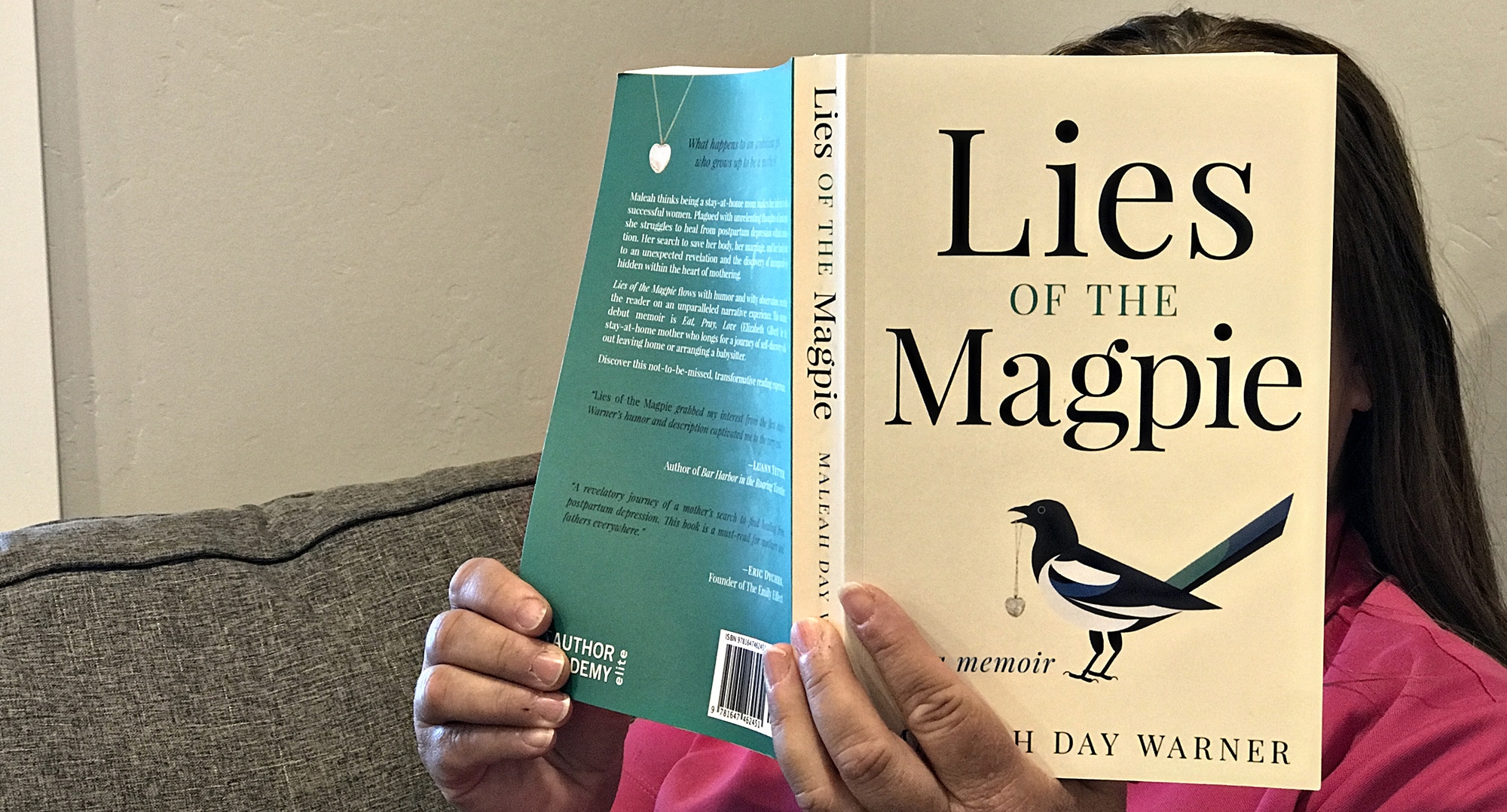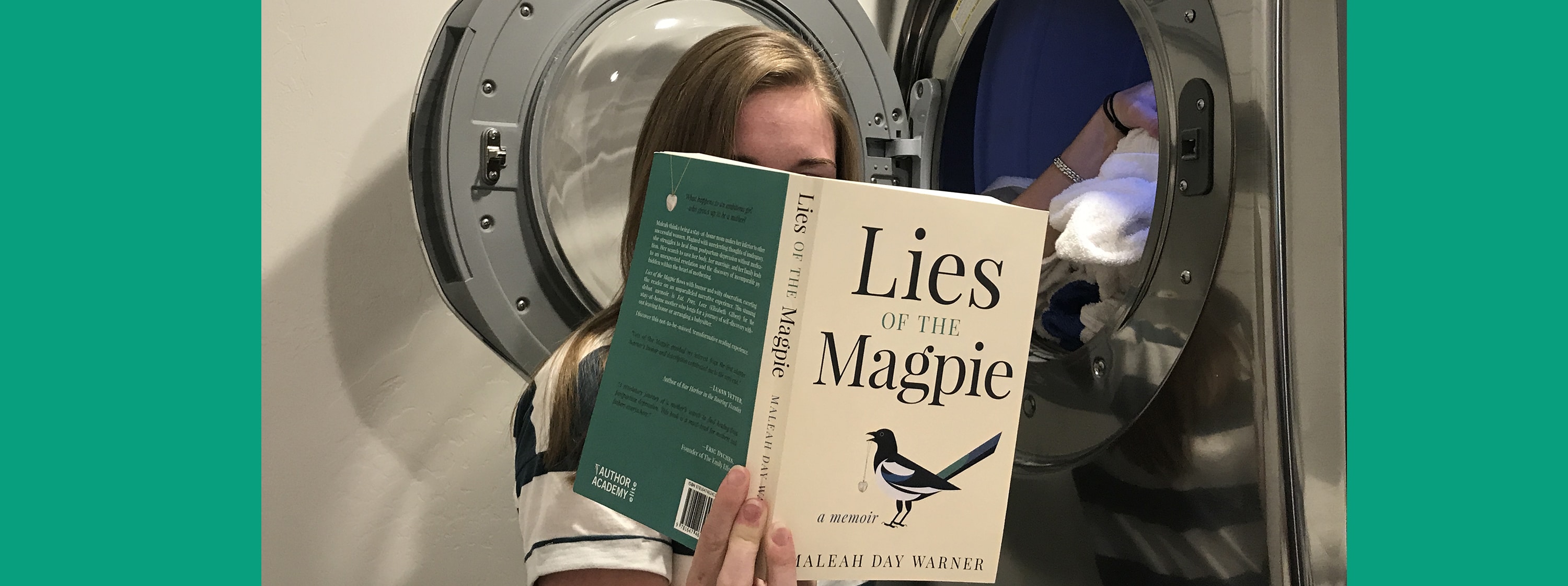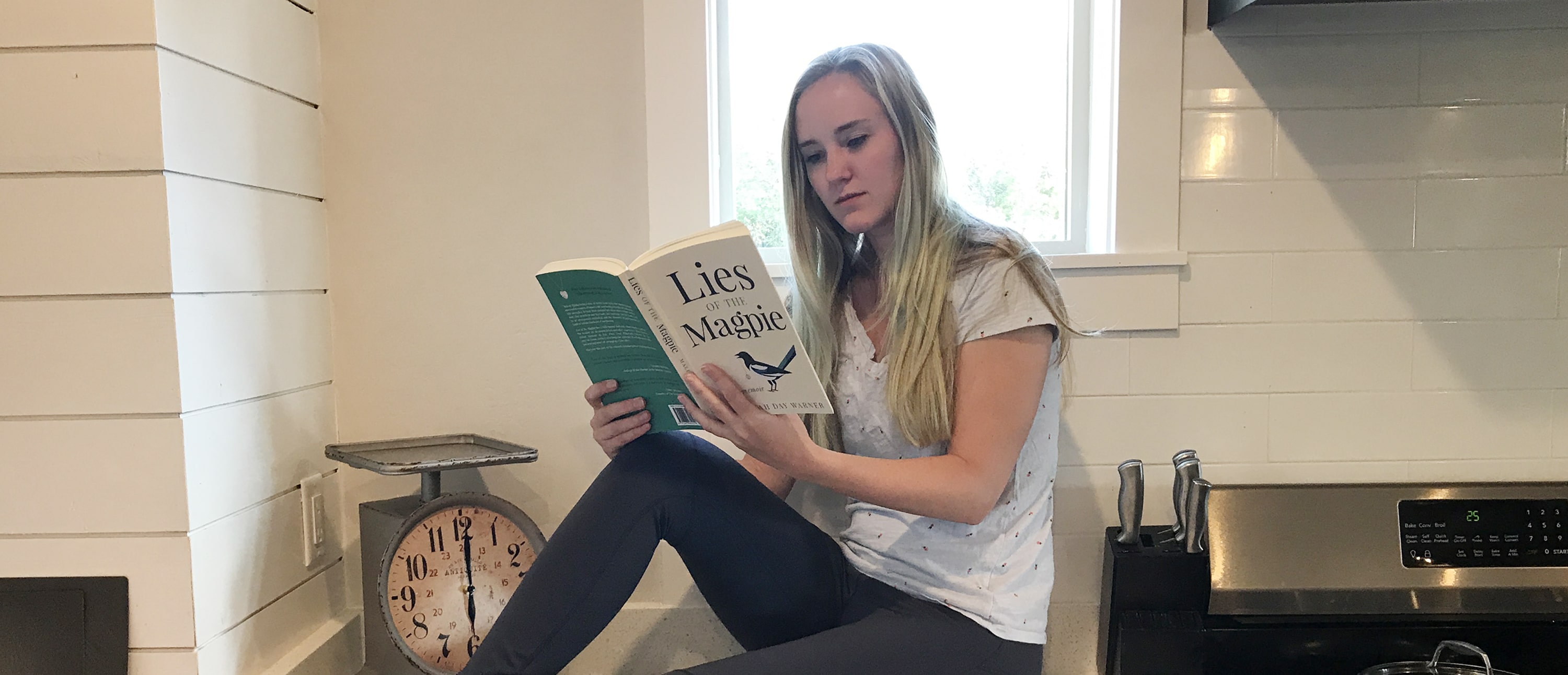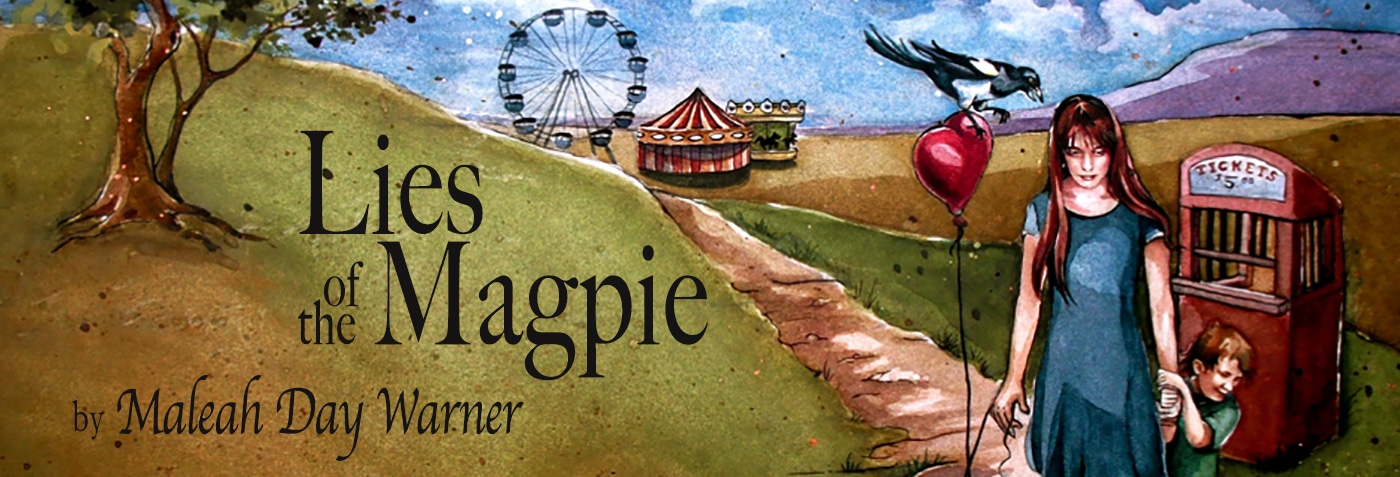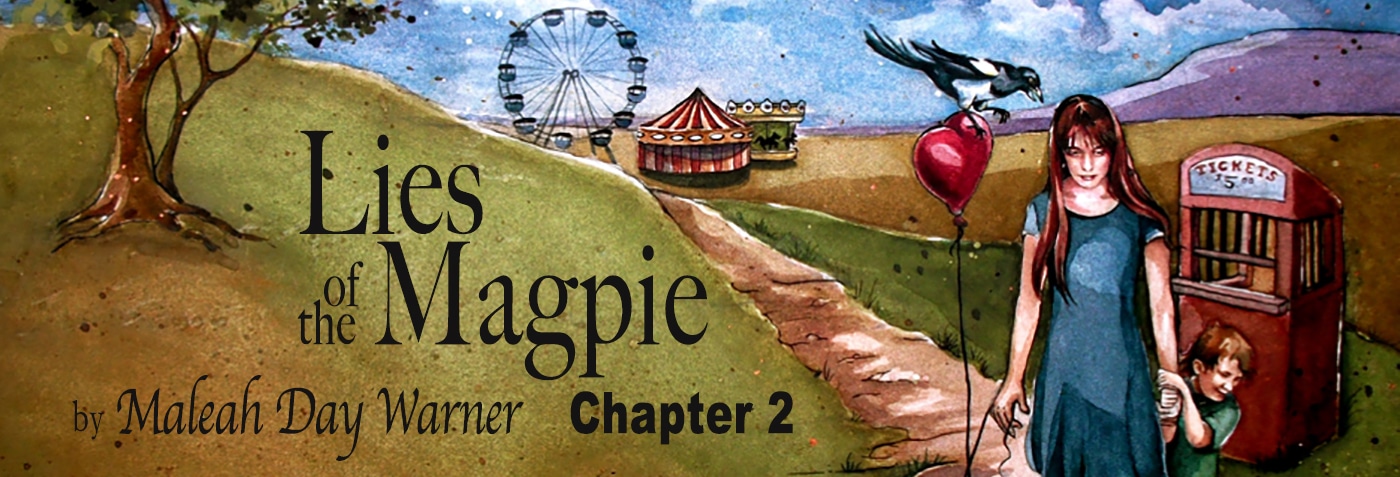Podcast: Play in new window | Download
Subscribe: Apple Podcasts | Google Podcasts | Spotify | Email | RSS | More
Podcast: Play in new window | Download
Subscribe: Apple Podcasts | Google Podcasts | Spotify | Email | RSS | More
Ep. 85 In the previous chapter, Maleah discovered who Laiah is and finally understood what was making her sick. Now, she has to figure out how to get well. She brings Aaron to her next doctor’s appointment to do the hardest thing she knows she has to do: accept a prescription for an antidepressant.
Podcast: Play in new window | Download
Subscribe: Apple Podcasts | Google Podcasts | Spotify | Email | RSS | More
Ep.84 Listen to the pinnacle chapter of Lies of the Magpie. Maleah’s struggles and months of searching for how to heal her body finally come together in an unexpected way. Did you predict this twist?
Podcast: Play in new window | Download
Subscribe: Apple Podcasts | Google Podcasts | Spotify | Email | RSS | More
On Ep.83, you can listen to chapters 38 & 39 of Lies of the Magpie by author Maleah Day Warner.
Podcast: Play in new window | Download
Subscribe: Apple Podcasts | Google Podcasts | Spotify | Email | RSS | More
Ep. 82 In Chapters 36 & 37 of Lies of the Magpie, Maleah finds herself caught in a tug-of-war between allopathic and homeopathic medicine. She struggles to decide whether to take the prescribed thyroid medication or continue homeopathic treatment in hopes that her body can heal itself naturally.
Podcast: Play in new window | Download
Subscribe: Apple Podcasts | Google Podcasts | Spotify | Email | RSS | More
Ep. 81 In Ch 34 & 35 of Lies of the Magpie, Maleah is desperate to find help for healing her body, and following the recommendation of friends, she visits a homeopathic doctor in her area.
Podcast: Play in new window | Download
Subscribe: Apple Podcasts | Google Podcasts | Spotify | Email | RSS | More
Ep. 68 What are the three most common mistakes we make regarding mental health issues? Join the podcast to learn how our instinct to respond by ignoring issues, reacting with fear, or trying to force a recovery actually compound mental health issues. Learn simple things to do instead that will encourage health, build relationships, and end the stigma and shame surrounding mental health issues.
Podcast: Play in new window | Download
Subscribe: Apple Podcasts | Google Podcasts | Spotify | Email | RSS | More
The word default has two meanings. One, it connotes a failure to meet an obligation or expectation. And this is what happened. By the time I told Aaron the news about our imminent arrival, our internet store had still not made a single sale. We had a hefty monthly business loan payment and zero business income. Default hints at a lapse of judgement, a miss, an overlook, a mistake. But it couldn’t have been Aaron’s fault for enthusiastically jumping onboard when I wanted to buy the same internet retail package that I was selling to business-minded adventurers from Idaho to Iowa. Nor how could Galaxy Mall be blamed for believing that every person with a home computer would be clicking and ordering before the year’s end? Who could have known it would take twenty years to shift the public’s habits away from brick and mortar shopping? Nobody else inside Galaxy Mall was making any sales. My company went under and I found myself pregnant, unemployed, and working assembly-line temp jobs.
But the word default can also mean a predetermined setting that the programmer has chosen the mechanism will automatically revert to when no other alternative is selected by the user. Clocks revert to midnight, calculators revert to zero, computers revert to basic programming. Mothers revert to caring for their offspring. We house, feed, and grow them within our bodies for 9 months, naturally we provide for their sleep, shelter, and food. This is mother’s instinct at its strongest. It’s our default setting.
Podcast: Play in new window | Download
Subscribe: Apple Podcasts | Google Podcasts | Spotify | Email | RSS | More
The thing Aaron remembers most about me from college is my fast-paced walk around campus. His tennis class met at three o’clock at the courts across from my off-campus housing. For weeks he watched me leave my apartment, hurry across the road, rush past the tennis courts, short cut across the grass and disappear into the Humanities Building. His tennis partner noticed him staring and said, “Don’t waste your time. That is Maleah Day. She is the Academic Vice President. Ten bucks says you can’t get her to stop to talk to you. She walks that fast everywhere she goes.”
It was my sophomore year. I was ten years older than the straggly nine-year-old girl from Ms. Wickersham’s fourth grade class. My bean-pole figure had filled out in a few key places. Two years of orthodontic work and contact lenses had tamed my profile, but my ambition—if possible—was still as potent. I’d traded my dream of becoming a firefighter and astronaut to becoming an Airforce pilot and a foreign ambassador. I declared a Political Science major and carried an application for the Peace Corps in my backpack.
Still, I’d never forgotten my dream to become Mrs. Murry from A Wrinkle in Time and have my own kitchen/chemistry lab. My scholarship covered full tuition and fees, regardless of number of credit hours, so in addition to my social science courses, I registered for a Biochemistry Series, Anatomy, Microbiology, and Physiology. These would cover all lab science prerequisites, just in case I changed my mind about Foreign Diplomacy and decided to apply to Medical School. It was a good plan, I thought, to keep both options open.
Play button above to hear the full chapter.
Listen to Chapter 1: https://maleahwarner.com/?p=1258&preview=true&_thumbnail_id=1269
Listen to the Introduction of Lies of the Magpie https://maleahwarner.com/new-summer-series/
Bethany Baker of Midsummer Studios https://midsummerstudios.weebly.com/
Podcast: Play in new window | Download
Subscribe: Apple Podcasts | Google Podcasts | Spotify | Email | RSS | More
Author’s Note:
In 2019 I was stuck in my writing. I’d spent hours revising, but the manuscript wasn’t getting better. Ready to throw in the towel, an unexpected solution manifested. When my new podcasting microphone arrived, I read from Lies of the Magpie to test the recording equipment, and voila! Something about reading the story out loud helped me to hear what wasn’t working and how to fix it. The chapters you hear on this podcast are drafts of the manuscript and are not as they appear in the final book.
The road I’m traveling stretches endlessly ahead across the Sonoran desert winding through a vast panorama of monotony. Each new mile looks exactly like the last. Faster, I urge the engine forward pressing my foot deeper into the gas pedal of my husband’s car. I’m supposed to be traveling to the Arizona Music Teachers Annual Convention in Tucson, but I haven’t seen another vehicle in at least thirty minutes. This can’t be I-10, there should be more traffic on a major interstate.
The red speedometer needle trembles over ninety miles per hour. Still, the barren scenery passes too slowly. I might as well be a pioneer driving an old wagon pulled by a pair of sauntering mules. The summer heat turns the car into a furnace. I reach over to crank up the air conditioner, but it is already blasting at full power in a futile effort to keep me, and my enlarged belly, from over-heating. So why is it getting hotter in this car?
A tightening pinch begins in my back and wraps around to my front. The contraction pulls and twists causing me to grab my stomach. I grit my teeth and grip the steering wheel to keep from swerving. Breathe, I remind myself, noticing that I’ve only covered seven miles since the last contraction. I squeeze my eyes shut tight against the pain, then re-open a narrow slit of vision—just enough to make sure my car tires stay on the road. I wince and wait. Two full minutes pass on the digital clock before the pressure releases. Tears burn in the corners of my eyes.
Please, baby, hold on a little longer.
Podcast: Play in new window | Download
Subscribe: Apple Podcasts | Google Podcasts | Spotify | Email | RSS | More
Episode 17 presents Part 2 of my conversation with Maternal Mental Health Specialist Amy-Rose White, LCSW. We discuss the importance of modeling emotional healthcare for our children as well as what dads, partners, and families can do to watch out for signs of postpartum health illnesses and steps for preventative care. Exciting changes are happening for Maternal Mental Healthcare in Utah, plus Amy-Rose tells us what changes she still wants to see.
Did you miss Part 1 of this interview? Click Here for Part 1
A: One way to help end the stigma surrounding mental health is to model healthy emotional needs for our children. We can say to daughters and sons, “I’m not well and I’m going to go get help and I’m going to figure this out.” Often it’s not easy to find the right help, the right team. Show your family that you are willing to keep trying, to keep opening doors and walking through until you feel well again.
Allow your children to see that you need rest and to see that self-care is natural and part of wellness. Know your self-care routine and what recharges your battery. I expect my sons to contribute as community members now so that when they grow up and have partners, and possibly decide to have children, they will take the responsibility on as well. They will help carry the burden of raising children. Especially this generation of women, the “Millennials,” fight the “Have everything and have it all now” pressure. Up and coming mothers are such high achievers and have a burden of options. The pressure is high, it really is. So it is essential to model caring for self and caring for emotional and physical health.
In the film about Postpartum Depression, entitled Dark Side of the Full Moon, one husband says, “Watch your wife. Keep your eyes on your partner.” I agree.
If partners can be educated about the warning and also help mom sleep, eat, drink water, and take breaks, these are preventative measures that can go a long way to prevent emotional health changes. Notice what your partner is going through and make the call with her or for her. Going with her to appointments says, “I love you enough that I want to help you get help and we’re going to figure this out together. There is nothing wrong with you.”
Ten percent of dads will develop postnatal depression, so a man also needs to watch out for himself, especially if mom can’t. Warning signs of postnatal illness in men are typically anger or withdrawal. The best remedy is to reach out to a counselor, which is not a guy thing to do. The language centers for men are different than for women. Men tend to need time alone to decompress. Another warning for dads is to be aware that if his partner has an illness, then his risk increases. Often I see that once a women is in remission and recovered, then her male partner gets the symptoms.
It’s a very sad thing I see in my practice, but sometimes relationships do end because of untreated Postpartum Depression. Divorce can occur during the postpartum period because the husband thinks, “This isn’t the person I fell in love with and I don’t see this ever getting better.” Or sometimes the woman might not be ready to get help, or the husband isn’t ready to get help. Postnatal health complications are challenging on a relationship.
The hundreds of women I’ve worked in say that even though their postpartum struggle was one of the hardest things they’ve ever endured, they wouldn’t trade the experience because of what they learned and who they became in the process of finding healing. Overall, couples who successfully work through postnatal emotional health complication come out with a deeper sense of empathy and compassion for human beings in general, as well as less judgment for women and for other moms.
The struggle creates a deeper connection for this universal experience on this planet of moms. Every mother in every country worries about essentially the same things: if her baby is eating enough and gaining enough weight and will get the education they need. We have a common thread as human beings that suffering brings to the forefront.
Another positive outcome I often see, and this was certainly true for myself, is a sense of purpose and a calling to connect with other moms and to help women and families to know they are not alone, they are not to blame, and with help they will be well. Which is the message of Postpartum Support International.
Becoming a parent forces you to become less selfish. With a child, you are instantly integrated into the world of babies, preschool, and school, so you have a vested interest in community, school, safety and what our world is becoming. The process is beneficial for our communities, so it’s not a thing to fear. There is a lot of growth that can come through the journey. Like we’ve mentioned, a deeper sense of strength, connection to the human spirit and to moms and motherhood and that we have more in common than we have different. And a desire to contribute and give back
Another positive outcome of postpartum health struggle is the “unlearning” of false beliefs and patterns. A lot of our role models as women were stoic and muscled through pain and illness, often because they had no other choice. Our mothers and grandmothers did the best they could, but now we are entering a different era where we can model being self-full. A postpartum health journey can help us to unlearn the conditioning of our ancestors to muscle through. Instead we can learn that when I am healthy, strong and centered, then I can be there in service for my children, my family, and for the planet.
Therefore, focussing on the personal strength you are developing through your postpartum health journey can be empowering. Though it’s a struggle, it can result in positive life changes including developing personal characteristics of empathy and connection as well as breaking down age-old habits and false beliefs.
This February PSI-Utah was successful in getting an appropriations measure passed in the state legislature to receive funding for three years to: 1) fund telehealth services for rural moms, 2) increase public health authority’s ability to screen and refer women, and 3) support the development of a new website through the Department of Health which will be a massive resource referral database where users can click on a geomap in your county and find counselors and support groups in your area that take your insurance.
The Perinatal Mood and Anxiety Disorders Conference is coming up May 31 and June 1, 2019 in Salt Lake City. This is cosponsored by Intermountain Healthcare with keynote speakers and breakout sessions by postpartum health experts. The conference is open to medical professionals as well as the general public. Information and registration found at psiutah.org or click here.
A State Subcommittee for Maternal Mental Health came out of PSI-Utah. Through the Utah Women & Newborn Quality Improvement Collaborative and the Department of Health, we are educating clinics and providers how to screen.Primary Care is where that subcommittee is focussing on improving quality measures and outcomes. Neither medical schools nor social work schools teach Perinatal Mental Health.
A lot of watch guards are hard at work continuing the dialogue about programs that need funding and increasing capacity for care.
Amy-Rose White, LCSW: http://www.arwslctherapist.com/
Perinatal Mood and Anxiety Disorders Conference May 31 – June 1, 2019 Salt Lake City Utah: https://www.psiutah.org/2019-perinatal-mood-anxiety-disorders-conference/
Documentary “Dark Side of the Full Moon” Maternal Mental Health: http://www.darksideofthefullmoon.com/
Postpartum Support International UTAH: www.psiutah.org
Postpartum Support International: www.postpartum.net
The Emily Effect: https://theemilyeffect.org/
